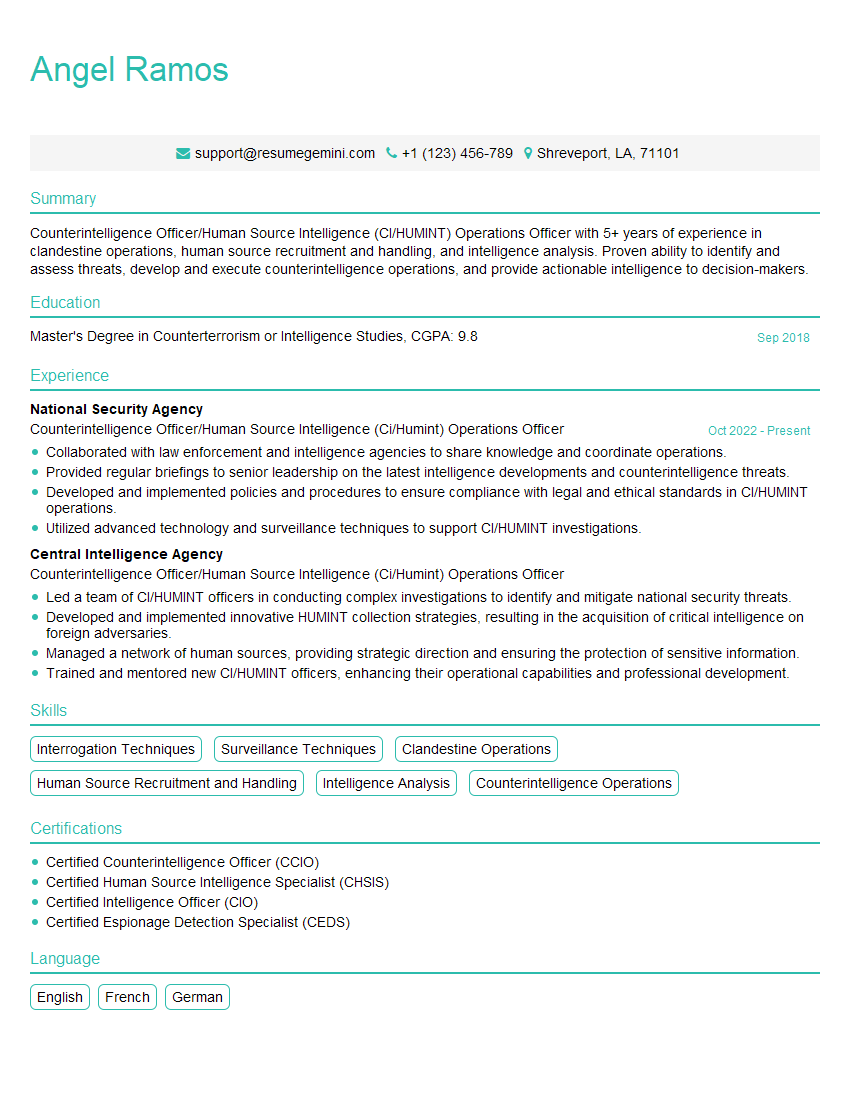Are you a seasoned Counterintelligence Officer/Human Source Intelligence (Ci/Humint) Operations Officer seeking a new career path? Discover our professionally built Counterintelligence Officer/Human Source Intelligence (Ci/Humint) Operations Officer Resume Template. This time-saving tool provides a solid foundation for your job search. Simply click “Edit Resume” to customize it with your unique experiences and achievements. Customize fonts and colors to match your personal style and increase your chances of landing your dream job. Explore more Resume Templates for additional options.

Angel Ramos
Counterintelligence Officer/Human Source Intelligence (Ci/Humint) Operations Officer
Summary
Counterintelligence Officer/Human Source Intelligence (CI/HUMINT) Operations Officer with 5+ years of experience in clandestine operations, human source recruitment and handling, and intelligence analysis. Proven ability to identify and assess threats, develop and execute counterintelligence operations, and provide actionable intelligence to decision-makers.
Education
Master’s Degree in Counterterrorism or Intelligence Studies
September 2018
Skills
- Interrogation Techniques
- Surveillance Techniques
- Clandestine Operations
- Human Source Recruitment and Handling
- Intelligence Analysis
- Counterintelligence Operations
Work Experience
Counterintelligence Officer/Human Source Intelligence (Ci/Humint) Operations Officer
- Collaborated with law enforcement and intelligence agencies to share knowledge and coordinate operations.
- Provided regular briefings to senior leadership on the latest intelligence developments and counterintelligence threats.
- Developed and implemented policies and procedures to ensure compliance with legal and ethical standards in CI/HUMINT operations.
- Utilized advanced technology and surveillance techniques to support CI/HUMINT investigations.
Counterintelligence Officer/Human Source Intelligence (Ci/Humint) Operations Officer
- Led a team of CI/HUMINT officers in conducting complex investigations to identify and mitigate national security threats.
- Developed and implemented innovative HUMINT collection strategies, resulting in the acquisition of critical intelligence on foreign adversaries.
- Managed a network of human sources, providing strategic direction and ensuring the protection of sensitive information.
- Trained and mentored new CI/HUMINT officers, enhancing their operational capabilities and professional development.
Certificates
- Certified Counterintelligence Officer (CCIO)
- Certified Human Source Intelligence Specialist (CHSIS)
- Certified Intelligence Officer (CIO)
- Certified Espionage Detection Specialist (CEDS)
Languages
- English
- French
- German
Career Expert Tips:
- Select the ideal resume template to showcase your professional experience effectively.
- Master the art of resume writing to highlight your unique qualifications and achievements.
- Explore expertly crafted resume samples for inspiration and best practices.
- Build your best resume for free this new year with ResumeGemini. Enjoy exclusive discounts on ATS optimized resume templates.
How To Write Resume For Counterintelligence Officer/Human Source Intelligence (Ci/Humint) Operations Officer
- Highlight your expertise in counterintelligence techniques, particularly in human source recruitment and handling
- Showcase your analytical skills and ability to interpret complex intelligence data
- Emphasize your experience in conducting clandestine operations and working with confidential sources
- Quantify your accomplishments whenever possible, using specific metrics to demonstrate your impact
Essential Experience Highlights for a Strong Counterintelligence Officer/Human Source Intelligence (Ci/Humint) Operations Officer Resume
- Conduct sensitive investigations to identify and neutralize foreign intelligence threats
- Recruit, develop, and manage human sources to gather vital intelligence information
- Analyze and interpret intelligence data to identify patterns, trends, and threats
- Develop and execute counterintelligence operations to mitigate threats and protect national security
- Provide briefings and reports to senior leaders on intelligence findings and recommendations
- Collaborate with law enforcement and other government agencies to share intelligence and coordinate operations
- Maintain a comprehensive understanding of domestic and international security threats
Frequently Asked Questions (FAQ’s) For Counterintelligence Officer/Human Source Intelligence (Ci/Humint) Operations Officer
What is the role of a Counterintelligence Officer/Human Source Intelligence (CI/HUMINT) Operations Officer?
A CI/HUMINT Operations Officer is responsible for identifying, assessing, and neutralizing foreign intelligence threats through the use of clandestine operations, human source recruitment and handling, and intelligence analysis.
What are the key skills required for a CI/HUMINT Operations Officer?
Key skills include interrogation techniques, surveillance techniques, clandestine operations, human source recruitment and handling, intelligence analysis, and counterintelligence operations.
What is the educational background required to become a CI/HUMINT Operations Officer?
A Master’s Degree in Counterterrorism or Intelligence Studies is typically required.
What are the career opportunities for CI/HUMINT Operations Officers?
Career opportunities include positions within government agencies such as the National Security Agency and the Central Intelligence Agency.
Is it necessary to have military experience to become a CI/HUMINT Operations Officer?
While military experience is not a requirement, it can be beneficial for gaining skills in intelligence gathering and analysis.
What are the ethical considerations for CI/HUMINT Operations Officers?
CI/HUMINT Operations Officers must adhere to strict ethical guidelines to protect the privacy and rights of individuals, and to ensure that intelligence collection is conducted in a lawful and ethical manner.
What are the challenges faced by CI/HUMINT Operations Officers?
Challenges include operating in complex and dangerous environments, managing sensitive information, and balancing the need for intelligence collection with the protection of civil liberties.